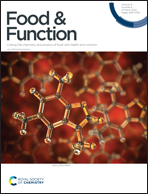Potential active constituents responsible for treating acute pharyngitis in the flowers of Hosta plantaginea (Lam.) Aschers and their pharmacokinetics†
Abstract
In Asia, the flower of Hosta plantaginea (Lam.) Aschers (hosta flower) is both an edible food and medicine. The hosta flower is often used as a material for cooking porridge and scented tea and in combination with other plants for alleviating pharyngitis. To clarify the anti-pharyngitis effect of the hosta flower and evaluate its potential active ingredients, an ethanol extract of the hosta flower was prepared and partially purified via chromatography on a column packed with D101 macroporous resin, which was eluted with different concentrations of ethanol. The anti-pharyngitis effect of the crude extract and the various partially purified fractions was examined in an ammonia-induced acute pharyngitis rat model. The 30% ethanol-eluted fraction significantly alleviated the severity of pharyngitis in the rat, as evaluated by changes in the levels of cytokines (IL-1β, IL-6, and TNF-α) and histological changes in the pharynx tissues. Subsequent HPLC-QTOF/MS (high-performance liquid chromatography coupled with quadrupole-time of flight tandem mass spectrometry) analysis of this fraction revealed kaempferol and its glycosides as the main components. Three of the main components were isolated and identified by 1D NMR. Their pharmacokinetics were studied for the first time by UHPLC-QQQ/MS (ultrahigh-performance liquid chromatography coupled with mass spectrometry). The findings suggested that the 30% ethanol-eluted fraction of the hosta flower extract may be a potential functional food for treating pharyngitis.

- This article is part of the themed collection: Food & Function HOT Articles 2022


 Please wait while we load your content...
Please wait while we load your content...